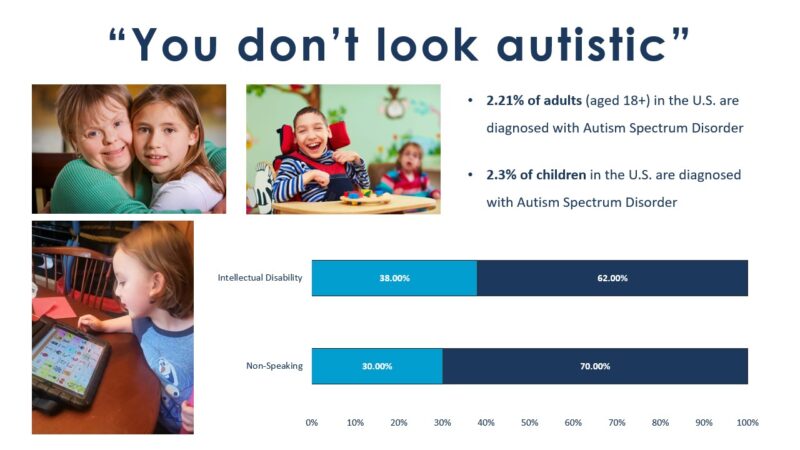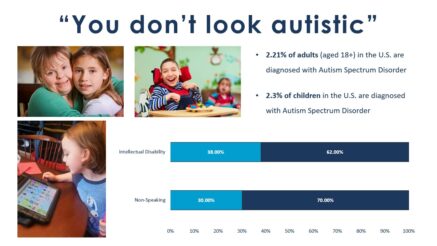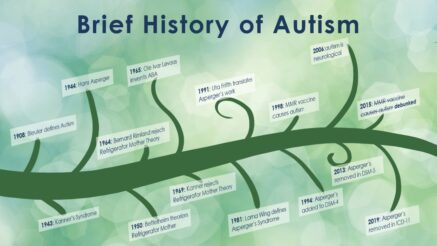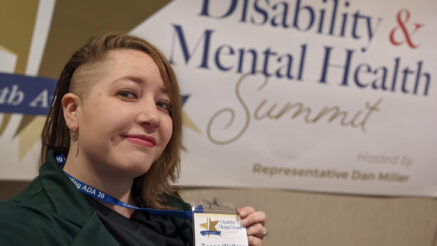This video is part of a larger presentation given by Tessa Watkins called “Unmasking Autism” for Dan Miller’s Mental Health & Disability Summit. The original presentation was given in-person in front of a live audience on May 23, 2022. Unfortunately, it was not recorded during the event so Tessa decided to record parts of it at home on May 3, 2023, so the information could be available to everyone.

Video Transcription
Slide 1
In this summit, you’ve heard from doctors, students, and other professionals in their respective medical fields. I’m none of those things, I’m just a programmer in the digital marketing industry so some of you might be thinking, “Tessa, what are your credentials that makes you qualified to talk about autism?”
[click to reveal first image] This is an autistic child.
[click to reveal other images] And this child grew up to become an autistic adult. Autism is a lifelong condition. I’ve had it since birth. My credentials are 31 years of first-hand experience. Compared to a BCBA who has a minimum of 6-8 years of studying children like me or a parent who might be learning about it for the first time with their 2-year-old. Neither of those archetypes know what it feels like to be autistic. They only observe it. I experience it every single moment of every single day.
Slide 2
“But Tessa, you don’t look autistic,” I know. And it’s not a compliment when you say that. I don’t look autistic right now because I’m masking. I’m reading from a script I wrote. Word-for-word. Right here front of me. I’m essentially acting like I’m not autistic for your comfort, so that I can deliver my message in a way that you’ll listen.
So when you say that to an autistic person, you’re praising me for being disingenuous. Inauthentic. A fake. You’re telling me that you like my portrayal of you.
But let me ask you, what do you think autism looks like if not me? Because I think I know.
[click] When I collected these photos, I didn’t search for photos of autistic people.
This is a mother with Down’s syndrome. She might also be autistic but the physical features you’re looking at, the almond eyes, that’s caused by Down’s, not autism.
This boy here has Cerebral Palsy. The physical features you’re looking at with him are his arms, the weak muscle tone and his difficulty with maintaining posture, all of that is caused by his Cerebral Palsy, not autism, though he might also be autistic.
This boy here, he’s actually a boy right here in Allegheny County. He doesn’t look autistic either. He’s just non-speaking and uses his device here to communicate. He might be autistic too.
Autism does not have any physical features. Autism can look like anyone and anyone can look autistic.
[click] About 2% of the adults in the United States have an ASD diagnosis.
[click] This is actually about the same for children.
[click] Of those children with an ASD diagnosis, up to 30% of them are non-speaking, meaning they don’t use mouth-words to communicate.
Of those children with an ASD diagnosis, [click] 38% of them have an intellectual disability, meaning they have an IQ that’s near or below 70 and struggle with adaptive skills.
But look at those numbers. Really look at them. This means 70% or more of these autistic children are speaking. More than 60% of these autistic children do not have an intellectual disability. I was one of those autistic kids that’s both speaking and without an intellectual disability.
Actually, I take that back. I didn’t have a diagnosis as a child and these numbers, which came from the CDC by the way, are only of children with a diagnosis. So when we see that the numbers of those with an autism diagnosis is rising, it’s actually because we’re getting better at identifying it. So yes, I still look autistic. This is what autism can look like.
References
- Dr. Ananya Mandal, MD, “Autism History” (Feb. 26, 2019). News-Medical. AZoNetwork.
- “Bruno Bettelheim” (Mar. 9, 2022). Encyclopedia Britannica.
- Sean Cohmer, “Early Infantile Autism and the Refrigerator Mother Theory (1943-1970)” (Aug. 19, 2014). The Embryo Project Encyclopedia.
- Jennifer LeGare, N.P., “Link between autism and vaccination debunked” (Mar. 24, 2022). Mayo Clinic.
- J.B. Barahona-Correa and Carlos N. Filipe, “A Concise History of Asperger Syndrome: The Short Reign of a Troublesome Diagnosis” (Jan. 26, 2016). Frontiers in Psychology. National Library of Medicine.
- Adam McCrimmon, “What happened to Asperger’s syndrome?” (Mar. 8, 2018). The Conversation US, Inc.
- Green summer background photo by Dmytro Tolokonov on Unsplash



